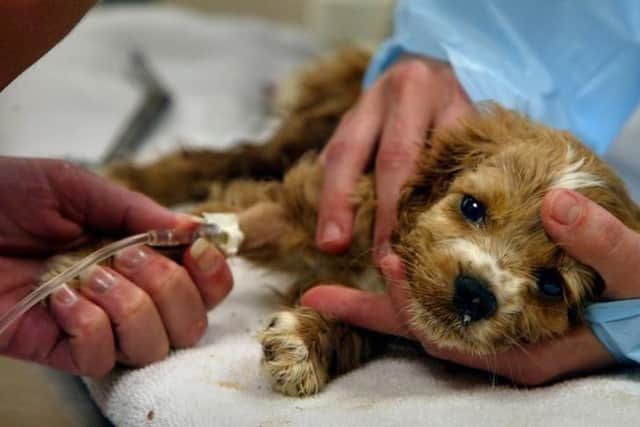Blackpool Council responds to fears of parvovirus outbreak and dog deaths
and live on Freeview channel 276
Blackpool Council said it is aware of posts on social media about dogs becoming ill after visiting the resort’s parks, with one dog tragically dying after contracting the deadly virus.
Dogs catch it by coming into contact with faeces from infected dogs and the virus can survive in the environment for up to nine months.
Advertisement
Hide AdAdvertisement
Hide AdIt can be fatal but the Council said it is not aware of any confirmed cases of parvovirus in the Blackpool area.


But some dog owners disagree and believe the virus is rife in the resort. One woman said her dog died last week after a walk in Crossland Road Park, off Vicarage Lane in Marton.
Ashlea Johnson’s 9-month-old American Bully XL, named Fury, sadly died on Friday (August 4) despite being vaccinated six months ago.
She believes he caught the virus during a visit to Crossland Road Park a week earlier. Fury’s sister is also battling the virus.
Advertisement
Hide AdAdvertisement
Hide AdShe said: “We had been on Crossland Road Park for not even 5 minutes whilst we waited to be called in to the vet (standard ear issue nothing serious) on Thursday, July 27.
"Fastforward a week and he fell severely ill and passed away.”
The Council said no confirmed cases have been reported to its dog warden, but dog owners are advised to remain vigilant and take precautions to help keep their dogs safe.
A spokesperson for Blackpool Council said: “We are aware of numerous posts on social media regarding Canine Parvovirus (parvo) in some of Blackpool’s parks.
Advertisement
Hide AdAdvertisement
Hide Ad"We have not had any confirmed cases reported to our Dog Warden team.
“However, as parvovirus can be very contagious, here’s some advice from the RSPCA on how to help keep your pooches safe.”
If your dog does become ill with a confirmed case of parvovirus after a visit to one of Blackpool’s parks or greenspaces, you can inform the Council’s dog warden on 01253 477477.
How do dogs catch Parvovirus?
Experts say a lot of dogs simply catch Parvovirus while out exploring because it can survive in outdoor environments for months to years.
Advertisement
Hide AdAdvertisement
Hide AdThe virus is shed in the poo of infected dogs three to four days after they are infected, then for a couple of weeks after their symptoms clear up.
It can also travel in dirt, so can be found on the bottom of shoes, inside houses, on dog leads, collars, bowls, clothes, toys, and even on human hands.
A spokesman for the PDSA said: "Most dogs are exposed to parvovirus at some point in their life, so the only way to protect them is through regular vaccination."
How to keep your dog safe
Parvovirus is preventable and vaccinations can protect dogs from the devastating effects of parvovirus.
Advertisement
Hide AdAdvertisement
Hide AdThe RSPCA advises that all puppies should be vaccinated against parvovirus at 8 weeks, with a second dose administered 2-4 weeks later.
They will be vulnerable to the disease until both doses have been received, which means owners must take extra precaution during this period.
Dogs require an annual booster to maintain a high level of protection against the virus.
As the virus is caught by contact with faeces from infected dogs, dog walkers should always ensure they bag up any dog mess and place it in the nearest bin.
You should contact your vet if you have any concerns about your dogs health or need vaccination advice.